DAVE'S DIARY - 6 NOVEMBER 2006 - TILLMAN FRANKS OBITUARY
TILLMAN FRANKS RIP AT 86
BORN
TILLMAN FRANKS - STAMPS, ARKANSAS SEPTEMBER 29, 1920
DIED SHREVEPORT, LOUISIANA - OCTOBER 26, 2006.
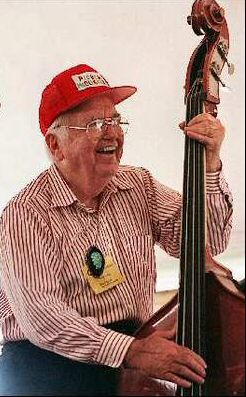 |
Veteran
songwriter Tillman Franks had his first brush with death as a passenger
in the Texas car crash that claimed Johnny Horton on November 5, 1960. Franks, who played bass fiddle in Horton's band, suffered serious head and internal injuries. The crash was just four years after Franks and Horton wrote the singer's hit Honky Tonk Man - also debut single for Kentucky born singing actor Dwight Yoakam. Franks, who still bore scars from the accident, died at the Grace Home Hospice in Shreveport on October 26 - three days after Yoakam's 50th birthday on the eve of his second Australian tour. Octogenarian Franks enjoyed a 60-year marriage to singing spouse Virginia whom he wed on Saturday, February 9, 1946. Yoakam performed Honky Tonk Man in his Australian concerts and Grammy award winning bluegrass band The Cox Family played at Franks' funeral service at Oakmont Church Of God in Shreveport. |
Rev Watson
Franks, one of Tillman's sons, conducted the service.
Another son Ben also sang at the funeral attended by legendary guitarist
James Burton who played with Franks on the Louisiana Hayride.
Rev Franks joked about the long marriage between his parents - a lengthy
union in a world where marriages often ended after short and stormy journeys.
"They never thought about divorce," he quipped.
"Murder, but not divorce. Daddy was many things to many people. He
believed in people... he would make stars."
Long-time family acquaintance Robert Davis, former player with the Crawdads,
was the drummer in a drum, bagpipes and bugle ensemble that paid last
musical respects at the burial.
They performed Going Home and Amazing Grace with the first
few bars of one of the hits Tillman and Horton wrote - Sink the Bismarck.
Franks, who also wrote Horton's 1956 debut #1 hit When It's Spring
Time In Alaska It's Forty Below, was buried at Forest Park West.
The legendary songwriter, publisher and manager detailed his colourful
life in recent biography I Was There When It Happened.
ARKANSAS TO LOUISIANA
Franks was
born in Arkansas and moved to Shreveport at the age of two.
He grew up in Cedar Grove - a suburb of Shreveport - attended Byrd High
School and learned to play guitar at age 14, inspired by his father and
the Grand Ole Opry.
He formed his first band at Byrd and called it the Rainbow Boys.
They performed standards such as Take Me Back to Tulsa, Wabash Cannonball
and Walkin' the Floor Over You at square dances, hootenannies
and "any place we'd find someone to listen to us."
Franks has always maintained Shreveport as home base.
"I was lucky to have lived my life in The Magic Circle," Franks
said in his biography.
"The Magic Circle is an area 50-miles in radius from downtown Shreveport.
All kinds of music evolved from this Magic Circle."
Those artists were as diverse as Gene Austin, Vernon Dalhart and Leadbelly.
W. K. Henderson started radio station KWKH in 1925 and increased the power
of The Magic Circle. That led to the creation of the Louisiana Hayride
in 1948 - from there music from The Magic Circle went around the world."
The many artists who hit Shreveport en route to stardom at the Hayride
include Hank Williams Sr., Elvis Presley, Webb Pierce, Faron Young, Johnny
Cash and many more.
TEENAGE ILLNESS
| When
he was a teenager, Franks was seriously ill with the flu. His folks had an old hand-cranked Victrola and his father purchased a new record. It was by Roy Acuff and the song was Would You Care. Franks loved the song and played it over and over to help pass the time. The sincerity that Acuff put across in the song and his simple yet complete delivery caught Franks' attention. At first he wanted to be a singer. Franks formed The Rainbow Boys with Claude King and Buddy Attaway. "I guess we called it The Rainbow Boys because we were looking for that pot of gold at the end of the rainbow," Franks said. But his hopes of being a singer were soon dashed. |
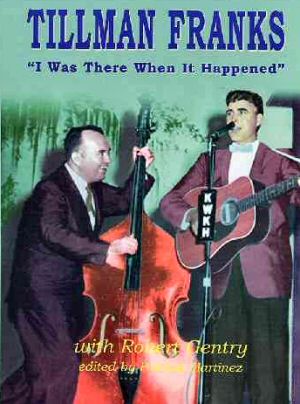 |
"Buddy,
Claude and I went down to KRMD studios in Shreveport to make a record.
Claude could sing like Ernest Tubb and Buddy could yodel like Jimmy Rodgers.
And of course I thought I was the next Roy Acuff. When we played the records
back, sure enough Claude sounded like Ernest and Buddy was yodelling like
Jimmy Rodgers. But when I heard my record, I said, 'Do I really sound
that bad?' " Buddy replied, "Yeah, we thought you knew."
Franks said, "I told them, 'You won't have to worry about me trying
to sing any more.' It was at that point that I decided to become a manager,
not a singer."
WORLD WAR 11 AND PETE SEEGER
Franks volunteered
for the U.S. Army on February 25, 1942.
While stationed at Tinker Air Base in Oklahoma, Franks met one of his
idols, Gene Sullivan.
They immediately become friends and from Sullivan he learned comedy.
Franks was sent to the Western Pacific to the island of Saipan on August
13, 1944 and formed another group The Rainbow Boys II.
One of the members of the group was Pete Seeger.
Gene Autry and his sidekick, comedian Ruff Davis, came to Saipan to entertain
the troops.
While there, Gene and Ruff appeared on Franks' program on WXLD.
After war Franks was discharged on December 1, 1945 at Camp Shelby, Mississippi.
The first thing on his agenda was to wed the love of his life - Virginia
Hellen Suber. They married on Saturday, February 9, 1946.
LOUISIANA HAYRIDE DEBUT
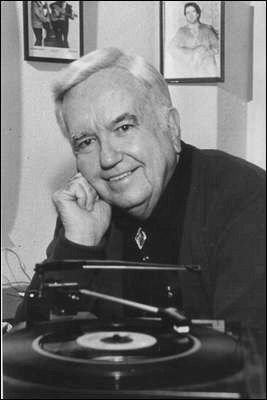 |
Later
that year he got a job playing bass fiddle with Harmie Smith who had
a show each morning on KWKH. He would work a show most nights within a 150-mile radius of Shreveport. Webb Pierce was working with him and later Franks got him to hire Buddy and Claude. By the first part of 1948, Franks was in Shreveport working for the Bailes Brothers. Franks said, "Johnny Bailes called me and said they had a recording session coming up for Columbia and needed some 'whiskey and devil songs.' He said he knew I was a good song writer and bass player." Franks played bass with the Bailes Brothers on the first night of the famed Louisiana Hayride on Saturday April 3, 1948. From then on, his life would be entwined with the Hayride. |
Shortly after
the Hayride started, Franks left Shreveport to go to Houston, Texas, to
join Buddy Attaway and Claude King on KLEE for Elmer Laird Auto Sales.
Laird had several car lots and a car-financing firm. Franks, Buddy and
Claude also sold cars.
"I could not drive a car, did not have a car and didn't have a drivers
license. But I was selling cars and I did pretty good," Franks said
in his biography.
"Elmer really wanted to be a song writer. We helped him write Poison
Love and a short time later he was knifed to death by an irate customer."
"We had made a recording of the song before he was killed,"
Franks revealed of a tune that was revived by Buddy Miller as the title
track of his 1997 album.
"After his death, Mrs. Laird put me on a bus for Nashville to see
if Eddy Arnold, who was a big star at the time, would record it. I talked
to Eddy and he said the song was a little too strong for him."
After Elmer's death, Franks' pay was cut to $50 a week, so he packed his
family up once again and headed back to Shreveport.
HANK
WILLIAMS STAMP SUIT
This time he got into the booking business with Johnny Bailes, Johnny
and Jack and Kitty Wells.
About this time Hank Williams Sr. came to Shreveport and Franks was among
first to befriend him.
"He couldn't get any bookings and I booked his first show dates in
Shreveport area," Franks said.
He booked Hank into the school auditorium at Powhatan, Louisiana.
Franks gave him a white western dress suit, because Williams did not have
one at the time.
It turned out to be Hank's first western dress suit.
A picture of Hank in the suit was used on the postage stamp that was issued
June 10, 1993 by the U.S. Postal Service to commemorate Williams' career.
Bookings got hard to come by, so Franks started teaching guitar lessons
at J&S Music Co. in Shreveport and playing bass with the Hayride staff
band.
MERLE KILGORE
His pupils
included producer Jerry Kennedy, Merle Kilgore and Tommy Sands.
Webb Pierce debuted on Hayride in November 1949 and Franks became his
manager in December 1951.
Pierce joined the Grand Ole Opry in September 1952 after he and Franks
split.
Franks played bass in Slim Whitman's band before briefly managing Billy
Walker.
In early 1953 Franks started working with Bill Carlisle and the Carlisles
as bassist and manager when they scored #1 hit with No Help Wanted in
December 1953.
By May 1954, Franks had left the Carlisles and moved back to Shreveport
and started booking shows and briefly managed Jimmy C. Newman.
Two months later Franks was managing and playing bass with popular Hayride
team - Jimmy Lee and Country Johnny Mathis, known as Jimmy and Johnny.
In early 1955, one night at the Hayride, Jimmy and Johnny earned an encore
but show producer Horace Logan, told them not to take one.
Franks told them to take one. They did and Logan fired Franks.
"He told me he would see that I never worked on the Hayride again,"
Franks said.
Franks befriended Elvis Presley in October 1954 and landed him on the
Hayride and booked him on other shows during the two years he was a member.
JOHNNY HORTON
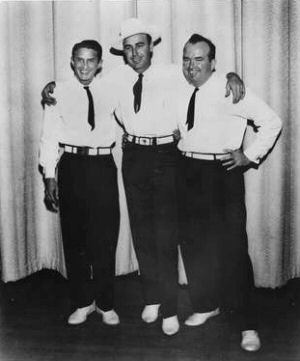 Tommy Tomlinson, Johnny Horton Tillman Franks |
In
the spring of 1955, Franks was back on the Hayride with an artist
that would prove to be his most successful - Johnny Horton. "I was starving to death again," Franks revealed. "I had been off the Hayride for about three weeks or a month and wasn't working. Johnny had married Billie Jean Jones Williams - Hank's widow. She had gotten a settlement from Hank's estate and they had spent it and were broke. Billie told him to get out of the house and go find a job." "So he came to me and asked me to manage him and I told him I didn't like his singing. He said, 'No problem, I'll sing any way you want me to.' He said Billie had told him if he could get me to manage him, he would go to Number One. So I decided to give it a try." |
Franks worked
out a deal to get Horton off Mercury Records and got him a contract with
Columbia, a bigger company that was trying to get into the Country Music
field and would spend more money on promoting Horton.
Horton's first cut, in early 1956, was Honky Tonk Man. It was a
hit.
This was followed by a string of hits including One Woman Man and
Honky Tonk Mind.
The first disc to go to #1 for Horton was Springtime In Alaska,
followed by Johnny Reb and Johnny Freedom.
Horton recorded title songs for two movies - Sink The Bismark and
North To Alaska, which starred John Wayne.
But the biggest hit was Jimmy Driftwood penned The Battle Of New Orleans
- it sold more than 2 million copies in less than a month and topped country
and pop charts.
On April 16, 1960, Franks walked off the job as head of the Artists Service
Bureau at the Hayride with Horton.
THAT FATAL TEXAS CADILLAC CRASH
Horton was
at his zenith when fate struck on the morning of November 5, 1960.
Franks and guitarist Tommy Tomlinson played a show with Horton at Skyline
Club in Austin, Texas that Friday night and were in Horton's white Cadillac
on the return trip to Shreveport.
Horton was to meet Claude King at Alligator Hole at Hall's Brake in Ajax,
Louisiana, for the first day of duck season.
Horton was "dogging it in" as he approached a railroad overpass
near the little Texas town of Milano.
At the crest of the overpass, Horton saw a car coming toward him and on
his side of the narrow roadway. There was nowhere for him to go.
The time was about 1:30 a.m.
Horton was pronounced dead upon arrival at St. Francis Hospital at Cameron,
Texas, 13 miles away, at 1:45 a.m.
Franks had suffered serious head and internal injuries.
The driver of the other vehicle was three feet in Horton's lane.
He was James Evans Davis - a student at Texas A&M College at Bryan.
He was headed for home in Brady when the accident occurred.
According to reports, Davis had been drinking a few hours prior to the
accident. Horton had a premonition that he would be taken by a sudden,
violent death.
CLAUDE KING
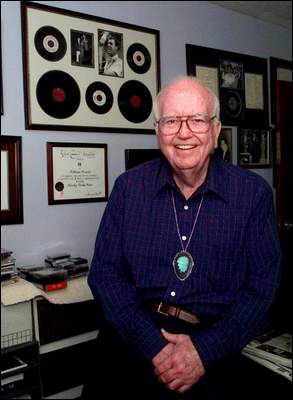 |
Franks
immediately got in touch with longtime friend Claude King and started
him on the road to stardom. In addition, Franks started to manage Horton's widow, Billie Jean. Within a short period of time, Claude was #1 in the charts with Wolverton Mountain. But the success was short-lived. By early 1963, Franks and Billie Jean had split and on August 12, 1963, he and King parted company. The same day he and King split up, Franks signed David Houston. The next day - August 13, 1963 - he recorded Mountain Of Love, written by Margaret Lewis and Mira Smith of Shreveport, at Robin Hood Brian's Studio in Tyler, Texas. |
Franks left
for Nashville on August 14 and got Houston a deal - the following Friday
the record was released and became a big hit.
Houston's many #1 hits included Almost Persuaded and duets with
Tammy Wynette and Barbara Mandrell.
He was a member of the Grand Ole Opry - for almost 22 years Franks managed
him.
While managing Houston, Franks signed Shoji Tabuchi, a fiddler who had
come from Japan to the United States to make it in the music business.
Franks managed Tabuchi for seven years during which he appeared as part
of David Houston Show.
Houston and Franks had a dispute and parted company in 1985 - Houston
died on November 30, 1993.
GOVERNOR JIMMIE DAVIS
| Franks
continued with Tillman Franks Singers that featured his wife and a
son. He also played bass with the legendary Jimmie Davis. Franks had arranged and promoted the song, Where The Ole Red River Flows, for Davis in the early 1960s when Davis was serving his second term as Governor of Louisiana. It was Davis' last song to hit the charts. |
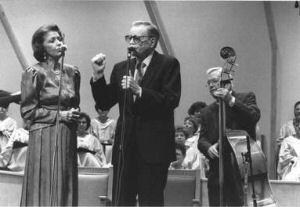 |
Davis celebrated
his 100th Birthday in Baton Rouge, Louisiana on September 10, 1999.
During his career for short periods of time, Franks managed Jimmy C. Newman,
Tony Douglas, Mitchell Torok and Claude Gray.
On July 11, 1996, KWKH sponsored Tillman Franks Day in Shreveport.
Many friends honoured him - including Claude King, Merle Kilgore, Homer
Bailes, Frank Page, Norm Bale, Ronnie Pugh, T. Tommy Cutrer, Tom Perryman,
Waylon Stubblefield, Maggie Warwick and The Cox Family.
Franks played on the 50th Anniversary Louisiana Hayride program at Shreveport
Municipal Auditorium on Saturday, April 3, 1999.
Franks was among the few who appeared on the first broadcast of the Hayride
and then again 50 years later.
THE
GOOD SHEPHERD
"Tillman really created the artist management business," said
Ken Shepherd - father-manager of latter day blues star Kenny Wayne Shepherd.
"He set the standard in the early days for what would later become
the way we all do business, protecting artists and developing their careers.
In my opinion, he was a creative genius in the way he marketed his artists
and cared about them."
Franks was a charter member of Country Music Association, a member of
Louisiana Hall of Fame and Rockabilly Hall of Fame.
Wife Virginia, two daughters, two sons, two brothers, eight grandchildren
and one great-grandchild are Franks' survivors.